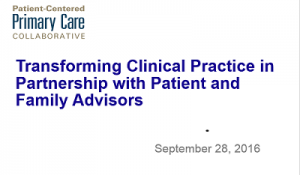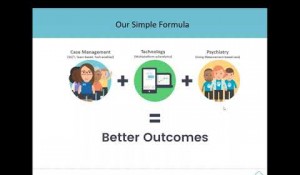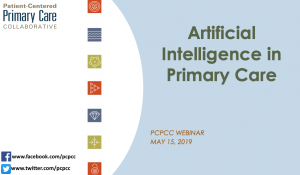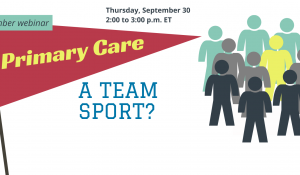You are looking at an archived version of our site. Please visit thepcc.org for a fresh, new experience!
Team-Based and Collaborative

- Interdisciplinary teams, including individuals and families, work collaboratively and dynamically toward a common goal. The services they provide and the coordinated manner in which they work together are synergistic to better health.
- Health care professional members of the team are trained to work together at the top of their skill set, according to clearly defined roles and responsibilities. They are also trained in leadership skills, as well as how to partner with individuals and families, based on their priorities and needs.
Resources
Go to the resource - September 2021
Care Practices to Promote Patient Engagement in VA Primary Care: Factors Associated With High Performance - October 2020
Organizations with a strong team-based care infrastructure are better positioned to launch patient engagement programs, according to research published in the Annals of Family Medicine. “Collectively, our findings suggest that strengthening the foundation of the medical home by promoting full staffing of primary care teams, clearly defined roles of team members, effective leadership, and a practice culture of performance improvement may increase adoption and use of patient engagement practices,” the researchers conclude
Inquiry - August 2020
JAMA Internal Medicine - December 2018
Health Affairs - September 2017
Health Care Managementy Review - March 2017
This study looks at team dynamics and care coordination. Better team dynamics were associated with better clinician satisfaction and improved care coordination. Addressing collaboration and teamwork could help practices improve clinician satisfaction and lead to better outcomes.
Journal of Ambulatory Care Management - January 2017
This resource looks at a framework for collaboratives working on transforming primary care practices. It was shown that these collaboratives are effective in fostering practice transformation.
Journal of the Association of American Medical Colleges - March 2016
This resource explores a pilot that aimed to improve chronic disease management through collaboration between medical students and faculty. It showed great potential that interdisciplinary care teams can help to improve patient engagement and retention.
The Commonwealth Fund - December 2015
This resource explores how the relationship between community health workers (CHWs) and patients can improve care and lead to better outcomes. Community health workers are uniquely positioned in the context of their patients' lives which gives them valuable insights into how to best help their patients. Integrating community health workers into the care team and creating collaboration between clinicians and CHWs can help improve treatment adherence and health outcomes.
NASHP - August 2015
Dental care is an important part of comprehensive primary care, especially for children and young adults. This resource explores how a collaboration between safety net programs and oral health providers helps to create access for vulnerable populations, leading to more equitable care.
American Journal of Managed Care - June 2015
This study researched primary care teams and their impact on care transitions. It found that practices with strong physician leadership had improved team functioning in care transitions. Conclusions of the study suggested that healthcare reform efforts that emphasize integrated care teams will lead to enhanced teamwork and improved transitions, which will help to achieve the quadruple aim.
Pediatrics - March 2015
This study looks at how implementing collaborative, team-based care can affect treatments for children with attention-deficit/hyperactivity disorder (ADHD). It was found that treatments that helped to engage parents with the care team and with their child's behaviors and treatment dramatically improved outcomes. Engaging parents in this way can help to improve the efficacy of collaborative care.
Webinars
Secondary menu
Copyright © 2024 Primary Care Collaborative
























